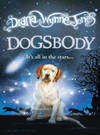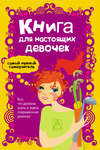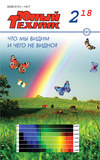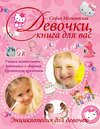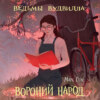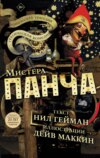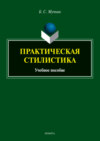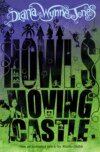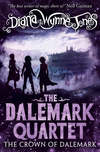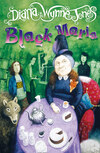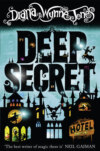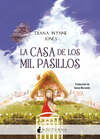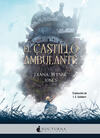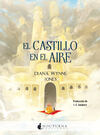Читать книгу: «Dogsbody»

Diana Wynne Jones
DOGSBODY

Illustrated by Tim Stevens

DEDICATION
For Caspian, who might really be Sirius
CONTENTS
Cover
Title Page
Dedication
Chapter One
Chapter Two
Chapter Three
Chapter Four
Chapter Five
Chapter Six
Chapter Seven
Chapter Eight
Chapter Nine
Chapter Ten
Chapter Eleven
Chapter Twelve
Chapter Thirteen
Chapter Fourteen
Chapter Fifteen
Chapter Sixteen
Also by the Author
Copyright
About the Publisher

CHAPTER ONE
The Dog Star stood beneath the Judgement Seats and raged. The green light of his fury fired the assembled faces viridian. It lit the underside of the roof-trees and turned their moist blue fruit to emerald.
“None of this is true!” he shouted. “Why can’t you believe me, instead of listening to him?” He blazed on the chief witness, a blue luminary from the Castor complex, firing him turquoise. The witness backed hastily out of range.
“Sirius,” the First Judge rumbled quietly, “we’ve already found you guilty. Unless you’ve anything reasonable to say, be quiet and let the Court pass sentence.”
“No I will not be quiet!” Sirius shouted up at the huge ruddy figure. He was not afraid of Antares. He had often sat beside him as Judge on those same Judgement Seats – that was one of the many miserable things about this trial. “You haven’t listened to a word I’ve said, all through. I did not kill the luminary – I only hit him. I was not negligent, and I’ve offered to look for the Zoi. The most you can accuse me of is losing my temper—”
“Once too often, in the opinion of this Court,” remarked big crimson Betelgeuse, the Second Judge, in his dry way.
“And I’ve admitted I lost my temper,” said Sirius.
“No one would have believed you if you hadn’t,” said Betelgeuse.
A long flicker of amusement ran round the assembled luminaries. Sirius glared at them. The hall of blue trees was packed with people from every sphere and all orders of effulgence. It was not often one of the high effulgents was on trial for his life – and there never had been one so notorious for losing his temper.
“That’s right – laugh!” Sirius roared. “You’re getting what you came for, aren’t you? But you’re not watching justice done. I tell you I’m not guilty! I don’t know who killed that young fool, but it wasn’t me!”
“The Court is not proposing to go through all that again,” Antares said. “We have your Companion’s evidence that you often get too angry to know what you’re doing.”
Sirius saw his Companion look at him warningly. He pretended not to see her. He knew she was trying to warn him not to prove the case against him by raging any more. She had admitted only a little more than anyone knew. She had not really let him down. But he was afraid he would never see her again, and he knew it would make him angrier than ever to look at her. She was so beautiful: small, exquisite and pearly.
“If I were up there, I wouldn’t call that evidence,” he said.
“No, but it bears out the chief witness,” said Antares, “when he says he surprised you with the body and you tried to kill him by throwing the Zoi at him.”
“I didn’t,” said Sirius. He could say nothing more. He could only stand fulminating because his case was so weak. He refused to tell the Court that he had threatened to kill the blue Castor-fellow for hanging round his Companion, or that he had struck out at the young luminary for gossiping about it. None of that proved his innocence anyway.
“Other witnesses saw the Zoi fall,” said Antares. “Not to speak of the nova sphere—”
“Oh go to blazes!” said Sirius. “Nobody else saw anything.”
“Say that again,” Betelgeuse put in, “and we’ll add contempt of court to the other charges. Your entire evidence amounts to contempt anyway.”
“Have you anything more to say?” asked Antares. “Anything, that is, which isn’t a repetition of the nonsense you’ve given us up to now?”
Rather disconcerted, Sirius looked up at the three Judges, the two red giants and the smaller white Polaris. He could see they all thought he had not told the full story. Perhaps they were hoping for it now. “No, I’ve nothing else to say,” he said. “Except that it was not nonsense. I—”
“Then be quiet while our spokesman passes the sentence,” said Antares.
Polaris rose, quiet, tall and steadfast. Being a Cepheid, he had a slight stammer, which would have disqualified him as spokesman, had not the other two Judges been of greater effulgence. “D-denizen of S-sirius,” he began.
Sirius looked up and tried to compose himself. He had not had much hope all through, and none since they declared him guilty. He had thought he was quite prepared. But now the sentence was actually about to come, he felt sick. This trial had been about whether he, Sirius, lived or died. And it seemed only just to have occurred to him that it was.
“This Court,” said Polaris, “has f-found you guilty on three counts, namely: of m-murdering a young luminary s-stationed in Orion; of grossly m-misusing a Zoi to com-m-mit that s-said m-murder; and of culpable negligence, causing t-trepidation, irregularity and d-damage in your entire s-sphere of inf-fluence and l-leading t-to the l-loss of the Z-zoi.” For the moment, his stammer fazed him, and he had to stop.
Sirius waited. He tried to imagine someone else as denizen of his green sphere, and could not. He looked down, and tried not to think of anything. But that was a mistake. Down there, through the spinning star-motes of the floor, he looked into nothing. He was horrified. It was all he could do not to scream at them not to make him into nothing.
Polaris recovered himself. “In p-passing this s-sentence,” he said, “the Court takes into cons-sideration your high eff-ffulgency and the s-services you have f-formerly rendered the Court. In view of these, and the f-fact that you are l-liable to rages in which you cannot be s-said to be in your right m-mind, the Court has d-decided to revive an ancient p-prerogative to p-pass a s-special kind of s-susp-pended s-sentence.”
What was this? Sirius did not know what to think. He looked at his Companion, and then wished he had not, because of the doubt and consternation he saw in her.
“D-denizen of S-sirius,” said Polaris, “you are hereby s-sentenced to be s-stripped of all s-spheres, honours and eff-ffulgences and banished f-from here to the body of a creature native to that s-sphere where the m-missing Z-zoi is thought to have f-fallen. If, d-during the life s-span of that creature, you are able to f-find and retrieve the Z-zoi, the Court will be p-pleased to reinstate you in all your f-former s-spheres and d-dignities. F-failure to retrieve the Z-zoi will carry no f-further p-punishment. In the Court’s op-pinion, it is s-sufficient that you s-simply die in the manner natural to creatures of that s-sphere.”
Slow as Polaris was in giving this extraordinary sentence, Sirius had still barely grasped it when Polaris sat down. It was unheard of. It was worse than nothing, because it condemned him not only to exile but hope – hopeless, brutish hope, over a whole uncertain lifespan. He flared up again as he realised it.
“But that’s the most preposterous sentence I ever heard!”
“Quiet,” said Antares. “The Court orders the prisoner taken away and the sentence carried out.”
“Try saying preposterous, Polaris!” Sirius shouted as they led him away.
The sentence was carried out at once. When he came to himself, Sirius was no longer capable of protesting. He could not see clearly, or speak. Nor did he think much, either. He was very weak and very, very hungry. All his strength had to be spent fighting for food among a warm bundle of creatures like himself. He had just found himself a satisfactory slot and was feeding, when he felt himself plucked off again by a large invincible hand and turned upside down. He made noises in protest, and kicked a little.
A great gruff voice, probably a woman’s, said words he did not understand. “That’s the sixth beastly dog in this litter. To one bitch. Blast it!”
Sirius was plunked unceremoniously back, and fought his way to his slot again. He did not think much about anything but feeding for quite a while after that. Then he slept, wedged warmly among the other creatures, against a great hairy cliff. It was some days before he thought about anything but food and sleep.
But at length he was seized with an urge to explore. He set off, crawling strenuously on four short legs which seemed far too weak to carry his body. He tripped several times over the folds on the rough cloth he was crawling on. The other creatures were crawling vaguely about, too. More than once, Sirius was bowled over by one. But he kept on, blinking, trying to see where the strong light was coming from a little further off. He came to cold floor, where crawling was easier.
He was nearly in the strong, warm light, when footsteps clacked towards him. The ground shook. He stopped uncertainly. Once again, he was seized by something ineffably strong and turned upwards, kicking and undignified, towards a vaguely looming face. “You’re a bold one,” remarked the great gruff woman’s voice. Then, as Sirius blinked, trying to see what had caught him, the voice said, “I don’t like the look of your eyes, fellow. Something tells me Bess has been a naughty girl.”
Since he understood none of the sounds the gruff voice made, Sirius felt nothing but exasperation when he was put back in the dark on the rough cloth. Now he would have all that crawling to do again. He waited for the heavy footsteps to clack away, and then set off again.
It did no good. He was put back by someone – either the woman or a being with a hoarse youth’s voice – every time he reached the light. He cheeped with frustration. Something in him craved for that light. Why would they not let him have it?
He was in the doorway the next day, when they came – the woman, the hoarse youth, and another person. They nearly trod on him. Sirius knew it, and cowered down in terror. The woman, with an exclamation of annoyance, plucked him up from the cold floor into the light.
“Blast this one! It is a wanderer.” Sirius was quite used to being picked up by this time. He lay quiet. “Well?” said the woman. “What do you think, Mrs Canning dear? Those markings aren’t right, are they? And look at its eyes.”
Sirius felt the attention of the other person on him. It felt wrong, somehow. He struggled, and was firmly squeezed for his pains. “No,” said a new voice thoughtfully, and it troubled Sirius. It and the smell that went with it set up a ripple that was nearly a memory in his head. “Wrong eyes, wrong colour ears. Your bitch must have got out somehow, Mrs Partridge dear. What are the others like?”
“The same, with variations. Take a look.”
There were indignant cheepings that told Sirius that his companions, less used to being handled than he, were being bundled about too. Above the noise, the three voices held a long discussion. And below the cheeping, there was a deeper, anxious whining.
“Shut up, Bess! You’ve been a bad girl!” said the voice called Mrs Partridge. “So you don’t think these’ll fetch any money at all?”
“You might get a pound or so from a pet shop,” said the voice called Mrs Canning. “Otherwise—”
“Much obliged!” Mrs Partridge said. There was such an unmistakable note of anger in her voice that Sirius cringed and his companions stopped cheeping. They were silent when they were plunked back on the ground, though one or two whimpered plaintively when the big anxious mother licked them.
The footsteps went away, but two sets of them returned, briskly and angrily, not long after. All the puppies cringed instinctively.
“Blast you, Bess!” said Mrs Partridge. “Here I am with a parcel of mongrels, when I might have got nearly a hundred quid for this litter. Got that sack, Brian?”
“Uh-huh.” The hoarse youth never used many words. “Brick too. Oughtn’t we to leave her one, Mrs Partridge?”
“Oh, I suppose so,” the woman said impatiently. Sirius felt himself seized and lifted. “Not that one!” Mrs Partridge said sharply. “I don’t like its eyes.”
“Don’t you?” The youth seemed surprised, but he dumped Sirius down again and picked up the next nearest to set beside the mother. The mother whined anxiously, but she did not try to stop him as he seized the other puppies one by one and tossed them into dusty, chaffy darkness. They tumbled in anyhow, cheeping and feebly struggling. Sirius was carried, one of this writhing, squeaking bundle, pressed and clawed by his fellows, jolted by the movement of the sack, until he was nearly frantic. Then a new smell broke through the dust. Even in this distress it interested him. But, the next moment, their bundle swung horribly and dropped, more horribly still, into cold, cold, cold. To his terror, there was nothing to breathe but the cold stuff, and it choked him.
Once he realised it choked him, Sirius had the sense to stop breathing. But there was not much sense to the way he struggled. For as long as he had air and strength in his body, he lashed out with all his short weak legs, tore with his small feeble claws, and fought the darkness and the cold as if it were a live enemy. Some of the other puppies fought too, and got in one another’s way. But, one by one, they found the shock and the cold suffocation too much for them. Soon only Sirius was scratching and tearing at the dark, and he only kept on because he had a dim notion that anything was better than cold nothingness.
The darkness opened. Sirius did not care much about anything by then, but he thought he was probably dead. Being dead seemed to mean floating out into a grey-green light. It was not a light he could see by, and it was stronger above him. He had a feeling he was soaring towards the stronger light. Round bubbles, shining yellow, moved up past his eyes and put him in mind of another life he could not quite remember. Then the light was like a silver lid, thick and solid-looking overhead. It surprised him when he broke through the silver without pain or noise into a huge brightness that was blue and green and warm. It was too much for him. He took a gasping breath, choked, and became nothing more than a sodden wisp of life floating down a brisk river.
Behind him, at the bottom of the river, the rotten sack he had torn spread apart in the current and the other sodden wisps floated out. Two were beyond hope and were simply rolled along the mud and stones of the river bed. But four other wisps rose to the surface and were carried along behind the first. They went bobbing and twisting, one behind the other, round a bend in the river and between the sunny banks of a meadow. Here, the warmth beating from above began to revive Sirius a little. He came to himself enough to know that there was heat somewhere, and that he was helpless in some kind of nightmare. The only good thing in the nightmare was the heat. He came to depend on it.
The river passed hawthorn trees growing on its banks. The current carried Sirius through the shadow of one. He found himself suddenly in deep brown cold. The heat was gone. They had taken his one comfort away now. He was so indignant about it that he opened his eyes and tried to cheep a protest.
He could not manage a noise. But a second later, the river carried him out into sunlight again. Sun struck him full in the eyes and broke into a thousand dazzles on the ripples. Sirius snapped his eyes shut again. The brightness was such a shock that he became a limper wisp than ever and hardly knew that the warmth was back again.
It grew warmer – a golden, searching warmth. “It is you, Effulgency!” someone said. “I thought it was!”
This was quite a different order of voice from those Sirius had heard so far. It puzzled him. It was not a voice he knew, though he had a feeling he had heard its kind before. He was not sure he trusted it. All the voices he had heard so far had done him nothing but harm – and he had a notion he had known voices before that, which had done him no good either.
“You aren’t dead, are you?” the voice asked. It seemed anxious. It was a warm, golden voice, and, though it sounded anxious, there was a hint of ferocity about it, as if the speaker could be far more dangerous than Mrs Partridge and her friends if he chose.
Sirius was not sure if he was dead or not. He felt too weak to cope with this strong, fierce voice, so he floated on in silence.
“Can’t you answer?” The warmth playing on Sirius’s scrap of body grew stronger and hotter, as if the speaker was losing patience. Sirius was too far gone even to be frightened. He simply floated. “I suppose you can’t,” said the voice. “I think this is just too bad of them! Well, I’ll do what I can for you. Just let them try to stop me!”
The warmth stayed, lapping round Sirius, though he sensed that the speaker had gone. He floated a little way further, until he came up against some things that were long, green and yielding. Here the warmth caught and pinned him, gently rocking. It was almost pleasant. Meanwhile, the other four half-drowned puppies floated on in midstream, round bends, to where the river became wider and dirtier, with houses on its banks.
A shrill voice spoke strange words near Sirius. “Oh, eughky! There’s a dead puppy in the rushes!”
“Don’t touch it!” said a voice rather older and rougher. And a third voice, gentle and lilting, said, “Let me see!”
“Don’t touch it, Kathleen!” said the second voice.
However, there were splashings and rustlings. A pair of hands, a great deal smaller and much more shaky and nervous than Sirius was used to, picked him out of the water and held him high in the air. He did not feel safe. The shakiness of those hands and the cold air frightened him. He wriggled and managed to utter a faint squeak of fear. The hands all but dropped him.
“It isn’t dead! It’s alive! Poor thing, it’s frozen!”
“Someone tried to drown it,” said the shrillest voice.
“Throw it back in,” said the second voice. “It’s too small to lap. It’ll die anyway.”
“No it won’t.” The hands holding Sirius became defiantly steady. “It can have that old baby-bottle. I’m not going to let it die.”
“Mum won’t let you keep it,” the rough voice said nastily.
“She won’t. And the cats’ll kill it,” said the youngest voice. “Honest, Kathleen.”
The girl holding Sirius hugged him defensively to her chest and began to walk – bump, jerk, bump – away from the river across the meadow. “Poor little thing,” she said. The two boys followed, arguing with her. Their clamour hurt Sirius’s ears, and the girl kept jerking him by turning round to argue back. But he realised she was defending him from the other two and was grateful. Her convulsive hugging was making him feel safer and a great deal warmer. “Oh!” Kathleen exclaimed, bending over him. “Its tail’s wagging!”
Robin, the younger boy, demanded to see. “It’s a queer little tail,” he said doubtfully. “You don’t think it’s really a rat, do you?”
“No,” said Kathleen. “It’s a dog.”
“It’s a rat,” said Basil, the elder boy. “An Irish rat. Shamus O’Rat!”
“Shut up,” Kathleen said wearily.
Бесплатный фрагмент закончился.
Начислим
+23
Покупайте книги и получайте бонусы в Литрес, Читай-городе и Буквоеде.
Участвовать в бонусной программе
